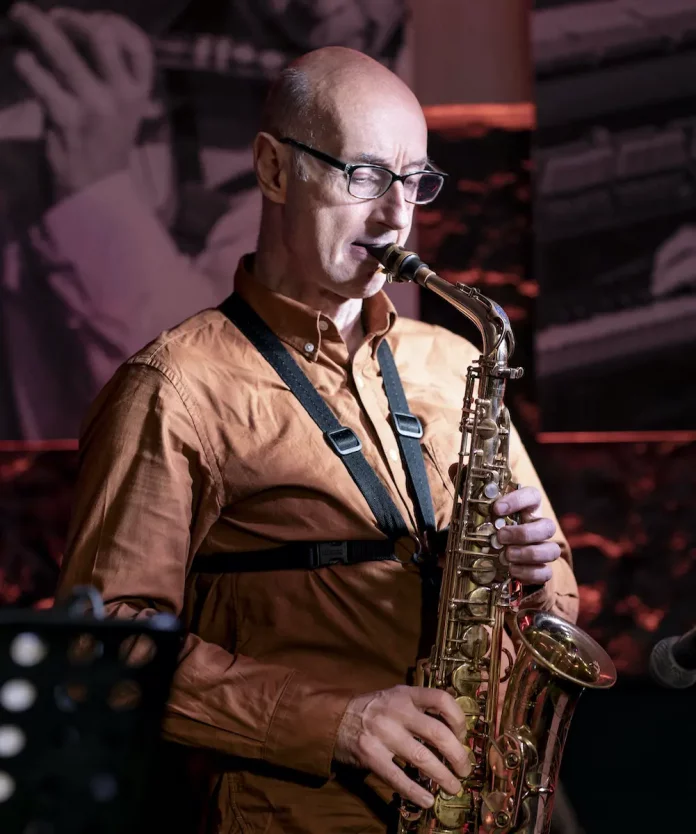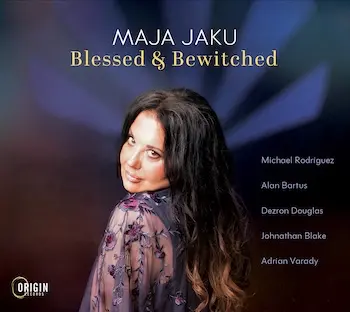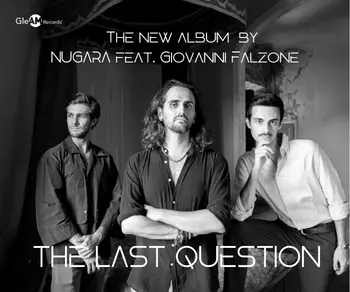Atlantic Jazz Collective featuring Norma Winstone and Joe LaBarbera: Seascape (Alma Records ACD50252)
As the title implies, Seascape is inspired by the ocean, its rhythm and mystery, reflected in the music of this group, the Atlantic Jazz Collective. There’s a long-standing connection here – Norma Winstone first met Mike Murley and Jim Vivian when she, Kenny Wheeler and John Taylor worked in the Maritime Jazz Orchestra some years before. The album was recorded in St. John’s, Newfoundland, a place with strong seafaring history, not least for its proximity to the Titanic.
Of the material here, four of the tracks are by Wheeler and Taylor and two by Ralph Towner, so there’s a leaning towards an ECM-style approach: clear, precise playing and polished arrangements.
Winstone’s reputation is high as a mainstay of jazz vocals and her voice retains the strength, suppleness and range for which she is renowned. Pianist Florian Hoefner is prominent, leading the group and taking many of the solos, whilst saxophonist Murley is also featured, his soprano appropriate for much of the material. But I found it’s his tenor that grabs the attention; more forthright and assertive, especially on Trying To Recall and This Is New. This last, a Kurt Weill composition, is the only one with non-Winstone lyrics; Ira Gershwin’s in this case.
Generally a feeling of optimism pervades the songs – “Despite the darkness, light from a Distant Star”. Memories are positive – “The help of human touch… take a hand in the dark” (Where Do We Go From Here); “Rain washing away the troubles of the past” (Turn Again); and “Spring’s arrival; a smile full of brilliant colours” (Always By Your Side). Widow In The Window is the exception and like Raffish (which shows off Winstone’s vocal gymnastics), is taken from a live performance. A well-produced and accomplished album, essential for the many Norma Winstone fans.
Fini Bearman: Last Night Of The World (Pastiche PR24005)
In contrast to Seascape, Fini Bearman’s latest release is in the more prosaic surroundings of south London – Old Kent Road and Catford Bridge rather than coastal Newfoundland – and this is reflected in the lyrics and the urban essence of the music, using electronic effects, energetic rock rhythms and backing vocals.
Like Winstone, Bearman has a clear delivery and impressive range, but stylistically is different. A number of times it’s not far from jazz-oriented mid-70s period Joni Mitchell and there are folk-rock elements here and there. And, as with Mitchell, there’s a welter of emotional issues.
Running through is a more pessimistic feel; of uncertainty, loss, impermanence, a distance away from the optimism of Seascape. It explores and contends with motherhood, relationships, self-determination and even collective experience, often ending in fatalism and regret: “This can’t be happening” (OKR); “I doubt if we will meet again” (WWEMA); “What do we care about stars? No comfort left” (Violent Universe); “Bloodshed on the parapet” (Rise Up). It’s not quite all despair – a glimmer in Forgiveness tells us there’ll be a time when darkness won’t overthrow. It’s certainly heartfelt and at the moment perhaps in keeping with the human condition.
Of the musicians, Tom Cawley handles piano and synths and guitarist Matt Calvert shows his wide points of reference when covering the electric aspects. Al Cherry is given acoustic duties on Stay Away From Me and Plz Call. Apparently it took some considerable time to put the album together and various musicians seem to have been added at different stages. Gareth Lockrane’s alto flute solos on OKR, and Rise Up has a spirited contribution by tenor saxophonist George Crowley. Strings are supplied by Alice Zawadski (violin) and Zosia Jagodzinska (cello), enhancing the textures on Plz Call and WWEMA.
There’s already interest in the album, Rise Up having been on BBC’s Jazz Record Requests recently. A UK tour is underway which includes a July date at the 1000 Trades in Birmingham.
Martin Speake and Will Butterworth: Love And Freedom (Pumpkin Records 015)
In comparison, this album was done in the blink of an eye. The story is that saxophonist Martin Speake and pianist Will Butterworth entered the studio, had a cup of tea, then played the entire album, no predetermination or prior consultation, just spontaneously improvised. No re-runs. That was it.
The result is an impressive piece of work which at times reminds me of the open-ended sessions that Peter Ind did with various musicians, and occasionally there’s a hint of Lee Konitz in Speake’s playing, at other times a solidity akin to Anthony Braxton. Each track is delineated by natural pauses, when each finishes what they were saying, when the conversation comes to a halt. It flows easily, rhythmically, the two showing great empathy and understanding, intuitively responding to each other.
The tracks vary in length and approach. The title track, Love And Freedom, is a thing of beauty and intimacy, as is Song, whereas the Monkish Symmetry, On The Same Page and Perception go down dissonant routes, the latter evolving into a smooth coda. Coombestone Tor has a dark piano introduction, ominous, as befits the rocky outcrop close to Hangman’s Pit. Speake’s horn moves through the cloud to cast a light on the satanic outline.
The Breath, one of the longer tracks at slightly over 10 minutes, is a clearly articulated conversation which holds the attention, Butterworth shadowing Speake with occasional interjections before developing a melodic foray in which the piano asserts itself. The other lengthy one, Dance, is more expansive, as you’d expect from the title, with a definite Spanish tinge.
The album was recorded not long before Speake’s contentious issue with Trinity Laban Conservatoire and its students. With the resultant interruption of his musical career, appearances are currently rare, though he has a gig playing Ellington’s Second Sacred Concert 25 June. As it’s essentially a spontaneous performance, this disc (and others forthcoming) will partially fill the gap for the time being. Hopefully normal service – whatever that is – will be resumed as soon as possible.
Janette Mason: ReWired (JM Music JM2024CD)
Jazz artists have often taken popular songs and adapted them – usually simply using the basic melody for further exploration and improvisation. Sometimes it’s a way of introducing a different audience to the music, the premise being that the tune is recognised then the interest is drawn towards the jazz content.
On this trio album by pianist Janette Mason, she reimagines jazz and pop tunes, taking songs she liked as a youngster or that had an influence on her and putting her own spin on them. She starts with Gary Numan’s synth-rocker Cars, its repetitive four-note sequence branching off into an improvised section but not without Mason’s own riffs. Similarly with Bowie’s John I’m Only Dancing: after the theme it departs from the tune but only briefly, before it returns.
Kate Bush’s The Man With The Child In His Eyes is a more interesting interpretation, as it goes into tangential lines of exploration, including a bowed solo by bassist Tom Mason. But I can’t help feel the piano moves too readily back into the melody.
Of the older standards, Rodgers and Hart’s Bewitched, Bothered And Bewildered is played at a faster than usual tempo, almost Bachian in its delivery, whilst Tom Mason is given space on Lullaby Of Birdland, in a fairly straightforward cover of Shearing’s number.
The only original composition is Prayer For The Planet, a thoughtful, considered and contemplative representation of her feelings about climate change and the state of the earth, using suitably foreboding bass tones. Saxophonist Paul Booth is featured to good effect, but the introduction of the backdrop heavenly choir seems unnecessary. Similarly there’s a darkness about Eleanor Rigby, and here Mason adeptly incorporates a soulful middle section.
Booth is able to stretch out on Olivia Rodrigo’s Good 4 U, but why this and Oasis’s Don’t Look Back In Anger are included is anyone’s guess, considering the originals. Perhaps the answer lies in her comment that “Jazz is a niche market and you need other things that bolster your career.” Fair enough, and the justification is that it makes it more widely appealing. There’s a plan to promote the album this year and next, including the Vortex in July, with three singles released from it.




